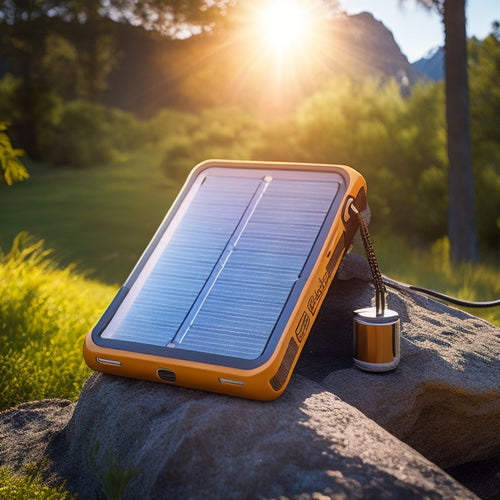
Why Remote Homes Need Solar Power Systems Online
Share
Living off the grid means relying on traditional energy sources that can be expensive, unreliable, and harmful to the environment. That's why you need a customized solar power system online. By harnessing nature's power, you'll guarantee energy security and reduce your carbon footprint. With solar power, you'll enjoy energy independence, lower energy costs, and a healthier environment. By going solar, you'll also reduce your reliance on fossil fuels and minimize air pollution. As you explore online solar power systems, you'll discover tailored solutions that meet your specific energy needs, and open up a cleaner, more sustainable future for your remote home.
Key Takeaways
• Remote homes need solar power systems online to ensure energy independence and reduce reliance on fossil fuels and the grid.
• Solar power systems provide a cost-effective and sustainable solution for remote homes with limited or no grid access.
• Online solar providers offer personalized solutions, accurate quotes, and quality products tailored to remote home energy needs.
• Solar power systems reduce carbon footprint, decrease greenhouse gas emissions, and promote a cleaner environment for future generations.
• Energy independence through solar power systems online enables remote homeowners to manage their energy usage and reduce energy costs.
Renewable Energy for Remote Areas
In remote areas where traditional electrical grids are often unavailable, you can rely on renewable energy sources to power your home or cabin. Renewable energy sources, such as solar, wind, and hydro power, offer a vital alternative to traditional energy sources. By harnessing the power of nature, you can guarantee energy security, even in the most rural locations.
This is especially significant for rural development, as access to energy is essential for economic growth and social progress.
Renewable energy sources can be tailored to meet the specific energy needs of your home or cabin. For example, if you have a small cabin, a small-scale solar power system can provide enough energy to power lights, appliances, and communication devices.
Additionally, renewable energy sources can reduce your reliance on fossil fuels, decreasing your carbon footprint and contributing to a cleaner environment.
Off-Grid Solar Power Advantages
You can enjoy energy independence with off-grid solar power systems, which offer several advantages over traditional grid-tied systems. For one, off-grid systems allow you to generate and store your own energy, reducing your reliance on the grid and providing a sense of energy security. This is particularly important for rural areas where grid access is limited, making off-grid solar power a key driver of rural electrification.
With an off-grid system, you're not tied to the grid's schedule or reliability, giving you the freedom to use energy as you need it. Additionally, off-grid systems promote energy democracy, putting the power in your hands to manage your energy usage and reduce your carbon footprint. This decentralized approach to energy generation also reduces the strain on the grid, making it a more sustainable option for the environment.
Environmental Benefits of Solar
Switching to solar power greatly decreases greenhouse gas emissions, helping to combat climate change and air pollution. You'll be doing your part to mitigate the devastating effects of climate change, which is one of the most pressing issues of our time.
By harnessing the energy of the sun, you'll markedly decrease your reliance on fossil fuels, a major contributor to greenhouse gas emissions. In fact, solar power systems can reduce carbon emissions by up to 78 million metric tons annually – that's equivalent to planting 1.2 billion trees!
Additionally, solar power reduces air pollution by minimizing the need for fossil fuels, which are responsible for poor air quality and respiratory problems. By choosing solar power, you'll be contributing to a cleaner, healthier environment for yourself and future generations.
Lowering Energy Dependence Online
By embracing solar power, you're not only reducing your carbon footprint but also gaining energy independence, as you'll be generating electricity right at your home, reducing your reliance on the grid and the associated energy costs. This shift towards self-sufficiency is especially vital for remote homes, where traditional energy infrastructure may be limited or unreliable.
With solar power, you'll have more control over your energy usage and can optimize your consumption with the help of advanced Energy Analytics. These tools provide real-time monitoring and insights, enabling you to make data-driven decisions about your energy usage.
As the Digital Grid continues to evolve, remote homes with solar power systems will be at the forefront of this transformation, paving the way for a more decentralized and resilient energy future. By reducing your energy dependence, you'll not only save money but also contribute to a more sustainable and efficient energy ecosystem.
Solar Power System Design Online
As you design your solar power system online, you'll need to take into account several important factors to make sure your system meets your energy needs.
You'll want to determine the right system size, choose the best energy storage options, and optimize panel orientation for maximum energy harvesting.
System Sizing Considerations
When designing a solar power system, you must determine the best system size to meet your energy needs without overspending on unnecessary capacity. To do this, you'll need to conduct a thorough load calculation, which involves identifying all the appliances and devices that will be powered by your system. This includes everything from lights and refrigerators to computers and televisions.
You'll also need to take into account the energy efficiency of each device, as well as your overall energy usage patterns.
An energy audit can be a helpful tool in this process, as it provides a detailed assessment of your energy needs and identifies areas where energy can be saved. By analyzing your energy usage patterns and identifying opportunities for efficiency improvements, you can optimize your system size and reduce your upfront costs.
A properly sized system will provide you with the energy you need while minimizing waste and maximizing your return on investment. By taking the time to carefully calculate your energy needs and design a system that meets those needs, you can secure a reliable and cost-effective source of power for your remote home.
Energy Storage Options
You'll need to carefully ponder energy storage options to ensure your solar power system can provide reliable power even when the sun isn't shining. This is especially important for remote homes that rely heavily on their solar power systems. Energy storage options come in various forms, each with its pros and cons.
Here are three factors to take into account when selecting an energy storage option:
-
Battery Life: The lifespan of your energy storage system will greatly impact your overall costs. Look for batteries with a long lifespan to minimize replacement costs.
-
Grid Connection: If you're connected to the grid, you may not need energy storage, as excess energy can be sold back to the utility company. However, if you're off-grid, energy storage becomes essential.
-
Depth of Discharge (DOD): This refers to the percentage of the battery's capacity that can be safely used without damaging the battery. A higher DOD means more efficient energy storage.
Panel Orientation Matters
Properly orienting your solar panels is essential to maximize energy production, since even a slight deviation from the most efficient angle can greatly impact your system's overall performance.
As you design your solar power system online, it's important to take into account the best panel angles for your specific location. In general, panels facing directly south (in the northern hemisphere) receive the most direct sunlight, resulting in maximum energy production. However, local shading analysis is also important to make sure your system operates at peak efficiency.
You'll want to assess potential shading from surrounding trees, buildings, or other obstacles that could impact energy production. By conducting a thorough shading analysis, you can adjust your panel orientation and layout to minimize energy losses.
Additionally, adjusting panel angles seasonally can also optimize energy production. For instance, tilting your panels slightly during winter months can increase energy output when the sun is lower in the sky. By carefully examining panel orientation and shading analysis, you can maximize your solar power system's performance and energy output.
Remote Homes Energy Independence
By integrating solar power systems into your remote home, you can achieve energy independence, reducing reliance on public utilities and minimizing your carbon footprint. This is especially important for rural living, where energy security can be a concern.
With a solar power system, you can generate your own electricity and reduce your dependence on the grid.
Here are three key benefits of energy independence:
-
Reliability: With a solar power system, you can guarantee a steady supply of electricity, even in areas with frequent power outages.
-
Self-sufficiency: By generating your own energy, you can lessen your reliance on public utilities and take control of your energy needs.
-
Environmental benefits: Solar power is a clean and renewable source of energy, reducing your carbon footprint and contributing to a cleaner environment.
Cost-Effective Renewable Solutions
Three cost-effective renewable solutions - solar, wind, and hydro power - can greatly reduce your energy expenditure while minimizing your environmental impact.
As a remote homeowner, you can harness these green innovations to power your home, reducing your reliance on traditional energy sources. Solar power, in particular, is an attractive option, offering significant energy savings and a decreased carbon footprint. By installing a solar power system, you can generate electricity from sunlight, reducing your energy bills and contributing to a cleaner environment.
Wind power is another viable option, especially if you live in a windy area. Wind turbines can be installed on your property, generating electricity and reducing your energy costs.
Hydro power, although less common, can also be a viable solution if you have access to a nearby water source. By leveraging these cost-effective renewable solutions, you can enjoy significant energy savings, reduce your environmental impact, and increase your energy independence.
With the right green innovations, you can create a sustainable and self-sufficient home that's environmentally friendly and cost-effective.
Solar Panel Maintenance Tips
Regular inspections and timely cleaning of your solar panels can greatly enhance their energy output, ensuring you reap the maximum benefits from your investment. Dust accumulation is a common issue that can reduce your solar panel's efficiency, making regular cleaning a must.
Here are some essential maintenance tips to keep in mind:
-
Schedule regular panel inspections: Perform visual inspections every 6-12 months to detect any signs of damage, wear, or debris accumulation.
-
Clean your panels regularly: Use a soft-bristled brush and mild soap solution to gently remove dirt and debris. Avoid using harsh chemicals or abrasive materials that can scratch the panels.
-
Monitor your system's performance: Keep an eye on your system's energy output and look for any unusual drops in performance, which could indicate a maintenance issue.
Reliable Online Solar Providers
When shopping for a reliable online solar provider, you'll want to look for trusted partners that can offer you accurate system quotes and guarantee the quality of their products.
You'll need a provider that can assess your energy needs and provide a personalized solution for your remote home.
Trusted Solar Partners
You can confidently rely on trusted online solar partners like Tesla, Sunrun, and Vivint Solar, which have established themselves as industry leaders in providing high-quality solar power systems and exceptional customer service. These partners have earned top ratings from customers and industry experts alike, guaranteeing that you get the best solar solution for your remote home.
When selecting a trusted solar partner, consider the following key factors:
-
Solar Certifications: Look for partners with certifications from reputable organizations, such as the North American Board of Certified Energy Practitioners (NABCEP).
-
Partner Reviews: Check online reviews from multiple sources, including Yelp, Google, and the Better Business Bureau, to get a holistic view of the partner's reputation.
-
Industry Expertise: Ensure that your chosen partner has extensive experience in designing and installing solar power systems for remote homes and can provide tailored solutions to meet your unique needs.
Online System Quotes
With just a few clicks, you can obtain accurate online system quotes from reliable solar providers, streamlining the process of finding the perfect solar power system for your remote home. This efficient process allows you to compare quotes from various providers, making system comparisons a breeze. You'll have access to a range of options, enabling you to make an informed decision based on your specific needs and budget.
Quote transparency is crucial in this process, as it guarantees you're getting the best deal possible. Reputable online solar providers will provide you with detailed quotes, outlining the system's components, installation costs, and expected energy savings. This level of transparency enables you to make a well-informed decision, avoiding any potential surprises down the line.
Quality Product Guarantee
Reputable online solar providers stand behind their systems with extensive warranties, guaranteeing that your investment in a remote home solar power system is protected for years to come. This warranty coverage provides you with peace of mind, knowing that you're protected against defects and performance issues.
When selecting a provider, look for those that adhere to stringent manufacturing standards, ensuring that their systems meet the highest quality and performance benchmarks.
Here are three key aspects to ponder:
-
Warranty duration: A thorough warranty that covers your system for 25 years or more provides long-term protection for your investment.
-
Manufacturing standards: Look for providers that adhere to industry-recognized standards, such as UL certification, to ensure your system meets the highest quality and safety benchmarks.
-
Performance guarantees: A reputable provider should guarantee a certain level of energy production, ensuring your system meets your energy needs.
Frequently Asked Questions
Can I Install Solar Panels on My Own or Do I Need a Professional?
'You can attempt a DIY solar panel installation, but make sure you prioritize DIY safety and comply with permit requirements; however, hiring a professional is recommended to avoid costly mistakes and ensure a safe, efficient system.'
How Long Does It Take to Recover the Cost of a Solar Power System?
You'll likely recover the cost of your solar power system within 5-7 years, depending on local Financial Incentives, through reduced energy bills and tax credits, making the Payback Period relatively short and worthwhile.
Are Solar Power Systems Affected by Extreme Weather Conditions?
You'll be relieved to know that solar power systems are designed with weather resistance in mind, incorporating storm preparedness features to minimize disruptions, ensuring a reliable energy supply even in extreme weather conditions.
Can I Use Solar Power With My Existing Energy Storage Systems?
Did you know 70% of homes with energy storage systems already use solar power? You can integrate solar power with your existing energy storage systems, achieving energy synergy through seamless system integration, maximizing your energy independence.
Do Solar Panels Require Regular Cleaning to Maintain Efficiency?
You'll notice dust accumulation on your solar panels reduces their efficiency, causing losses of up to 25%. Regular cleaning is essential to maintain peak performance and prevent efficiency losses, ensuring you get the most out of your solar power system.
Related Posts
-

Smart Home Thermostats to Revolutionize Your Space
Smart home thermostats revolutionize your space by providing precise temperature control and optimizing energy saving...
-

Top Portable Refrigerators for Camping Adventures
When you're camping, having a reliable portable refrigerator can make all the difference for keeping your food fresh ...
-

Fastest Solar Chargers for Emergency Power
When choosing the fastest solar chargers for emergency power, you need to focus on features like rapid charging capab...


